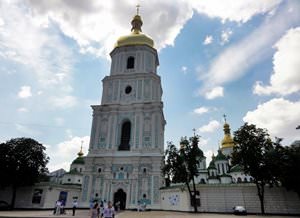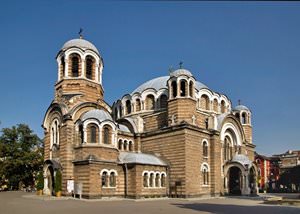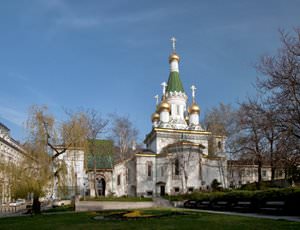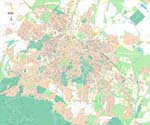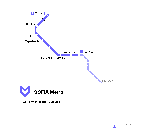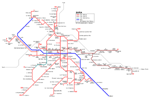Excursion tour in Sofia. Top architecture - monuments, castles, temples and palaces
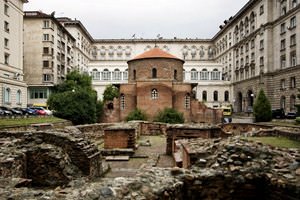 Saint Sofia Church, Sveti Sedmochislenitsi Church, Monument to the Tsar Liberator, Central Mineral Baths, Sofia University, and Russian Church are the main candidates that compete for the title of the major architectural symbol of Sofia. Just like in the first part of the guide, you can watch each monument by viewing its colorful 3D model in the Sofia flyover video on the left. Don’t forget to access our photo gallery and an overview of interesting facts regarding every monument. The map of the most important architecture sights of Sofia (located below this guide) will help you to create your own sightseeing tour through Sofia.
Saint Sofia Church, Sveti Sedmochislenitsi Church, Monument to the Tsar Liberator, Central Mineral Baths, Sofia University, and Russian Church are the main candidates that compete for the title of the major architectural symbol of Sofia. Just like in the first part of the guide, you can watch each monument by viewing its colorful 3D model in the Sofia flyover video on the left. Don’t forget to access our photo gallery and an overview of interesting facts regarding every monument. The map of the most important architecture sights of Sofia (located below this guide) will help you to create your own sightseeing tour through Sofia.
Saint Sofia Church, Sofia
Location on the map:  Facts:
Facts:
» The Saint Sofia Church or the Basilica of Saint Sofia is the oldest church that has survived to this day. The first churches were built here already in the 3rd century. They were destroyed during barbarians’ raids. In 537, the Saint Sofia Church was reconstructed on the initiative of Emperor Justinian I. » In the late 16th century, during the Ottoman invasion, Turks turned the Orthodox Church into a mosque, built a minaret, and got rid of paintings. In 1858, the minaret was destroyed by an earthquake, so Turks rebuilt it into a warehouse.
» The church was repeatedly restored in the 20th century and finally gained its original appearance. In 1998, the basilica was opened for parishioners.
» During archaeological excavations, catacombs with graves were found under the building. You can also see the fragment of the painting of the first church.
» In 1955, the Saint Sofia Church was declared a cultural monument.
Sveti Sedmochislenitsi Church, Sofia
Location on the map:  Facts:
Facts:
» The Sveti Sedmochislenitsi Church, or Seven Saints Church, was built at the site of the Black Mosque in 1903. The mosque was called like this because its minaret was made of black marble. The Black Mosque was founded in 1528. » When Bulgaria became independent from the Ottoman Empire, it was abandoned and dilapidated. The Christian Church was rebuilt on the initiative of A. N. Pomerantsev. A bell tower with four bells was constructed. The church was consecrated in honor of St. Cyril and Methodius and their followers: Savva, Clement, Nahum, Angelar, and Gorazd.
» When the church was rebuilt, the excavations were conducted. Under the foundation, the fragments of an old Christian Church dating back to the 5th century were found. Also, the fragments of Asklepion, the temple of the Roman god of medicine Asklepios where people were treated, were found here.
Monument to the Tsar Liberator, Sofia
Location on the map:  Facts:
Facts:
» The Monument to the Tsar Liberator is located in the main city square. It is dedicated to Russian Tsar Alexander II and soldiers participating in the Russian-Turkish Liberation War in 1878. » On the initiative of the Militia Committee, donations were collected for the construction of the monument. The People’s Assembly announced a competition for the best project of the monument. Projects of architects from 12 countries were considered.
» The international jury that consisted of specialists from the Roman, Paris, and Saint Petersburg Academy of Arts awarded the first prize to the Italian sculptor Arnoldo Zocchi. The monument was finished in 1901-1903.
» It was blessed in 1907. The festive ceremony was visited by the son of Alexander II Vladimir and his wife, their son Andrey, the regimental commander Stoletov, Bulgarian Generals Kaulbars and Parensov.
» For over a century, the monument had required to be restored. It was renovated by the Generation Fund in 2013 under the guidance of Andrey Skoch, a Russian businessman.
Central Mineral Baths, Sofia
Location on the map:  Facts:
Facts:
» The Central Mineral Baths were built in Sofia in 1913. They were built on a thermal spring and served as a spa center. » The money for the construction was allocated by several European banks. The building was quite impressive and attractive.
» In 1980, the Mineral Baths were closed by the city authorities. For many years, it was unclaimed and served only as an interesting architectural monument that catches the eye.
» In 2015, the authorities opened the National History Museum in the building. There is a room where ancient exhibits are kept. Here, you can see the Louis XVI Carriage that belonged to Prince Ferdinand I. In it, the prince and his wife had a wedding ceremony in 1893. There is also a desk presented to Ferdinand by Chancellor Bismarck. It is covered with 24-carat gold.
» In the room where personal belongings of citizens of the late 19th century, you can see clothes, shoes, pieces of furniture, and other exhibits.
Sofia University, Sofia
Location on the map:  Facts:
Facts:
» Sofia University was founded in 1888. Its first rector was young scientist Aleksandar Balan (1859-1959) who had been working at the university until his death. » In 1924, the Georgiev brothers donated money to build a new university.
» The building project was presented by the French architect Breancon. The Bulgarian architect Yordan Milanov arrogated to himself the right to this project. As a result, Breancon received large payoffs.
» The new university was opened in 1934. It was named after St. Kliment Ohridski, one of the seven students of St. Cyrill and Methodius, who was at the root of the creation of Slavonic writing.
» After the Second World War, the university was left by professors who didn’t support the communist ideology. Nowadays, the University of Sofia is the main education center in the country.
Russian Church, Sofia
Location on the map:  Facts:
Facts:
» The Russian Church in Sofia is also known as the Church of St. Nicholas the Miracle-Maker. It was decided to build to church after the Russian-Turkish War. The plot of land near the Russian embassy was allocated for it. » The construction began only in 1907 because fundraising had gone on for too long. The church was consecrated in 1914. The festive ceremony was visited by Prince Vladimir, the son of Alexander II.
» The First World War, during which Bulgaria opposed Russia, forced the church to cease its activity. Only after the Second World War, the Russian Orthodox Church was re-opened.
» In its chapel, Archbishop Seraphim who had worked here since 1921 until his death in 1950 was buried. He was canonized for performing miracles and helping believers.
» Russian Emperor Nicholas II donated bells for the bell tower to the Russian Church.
This guide to architecture monuments in Sofia is protected by the copyright law. You can re-publish this content with mandatory attribution: direct and active hyperlink to www.orangesmile.com.
City tours, excursions and tickets in Sofia and surroundings
Plan your own tour over Sofia on the monuments map
Thailand Relaxes Its COVID-19 Policy
New Year events in Thailand are likely to bring more people this year because everyone is tired of lockdowns and craving normal life. Many tourists, who book hotels in Pattaya, Krabi, or Phuket for the holiday season, also want to participate. As champagne has become an essential drink for New Year celebrations, the question regarding alcohol consumption comes to mind. The government allowed serving alcoholic drinks during the New Year countdown but only open-air cafes and restaurants with good ventilation will be permitted to do this until 1 am on 1 January 2022. This rule is nationwide. Read this
Read this
19.04.2024
New Year events in Thailand are likely to bring more people this year because everyone is tired of lockdowns and craving normal life. Many tourists, who book hotels in Pattaya, Krabi, or Phuket for the holiday season, also want to participate. As champagne has become an essential drink for New Year celebrations, the question regarding alcohol consumption comes to mind. The government allowed serving alcoholic drinks during the New Year countdown but only open-air cafes and restaurants with good ventilation will be permitted to do this until 1 am on 1 January 2022. This rule is nationwide.
19.04.2024


 English
English Russian
Russian Dutch
Dutch German
German Spanish
Spanish French
French Türkçe
Türkçe